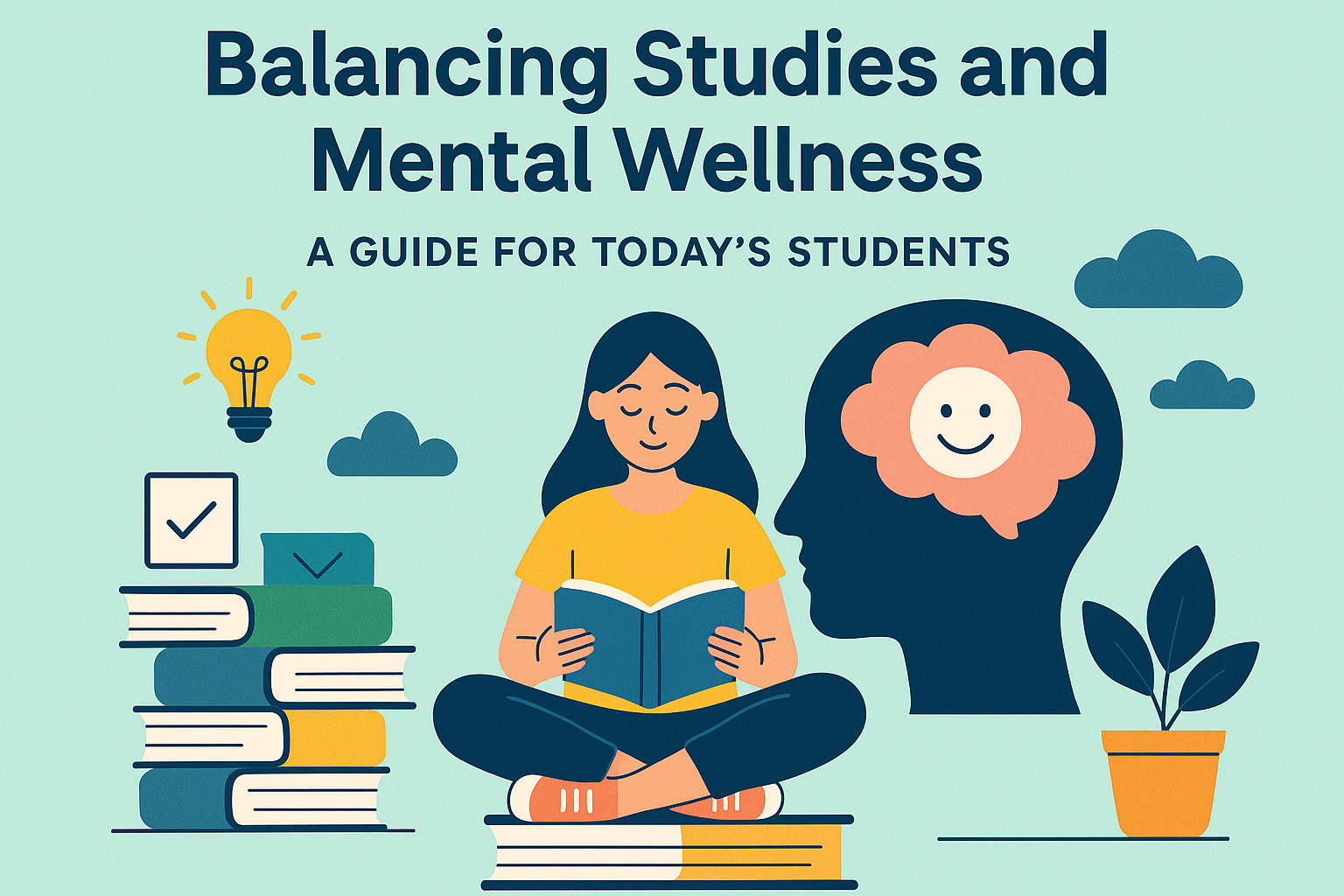
ntroduction: Why Balance Matters in Student Life
In today’s hyper-competitive world, students juggle heavy academic loads, extracurricular activities, social expectations, and digital distractions. While good grades and career goals are important, neglecting mental health can lead to burnout, anxiety, and even long-term health issues.
Balancing studies with mental wellness isn’t a luxury—it’s a survival skill. With the right mindset and strategies, students can achieve academic success without sacrificing happiness or peace of mind.
1. Understanding the Student Stress Landscape
- Academic Pressure: Board exams, competitive entrance tests, and grade-based comparisons dominate student life, especially in countries like India, China, and South Korea.
- Digital Overload: Social media, online classes, and constant notifications increase screen time, reducing sleep and focus.
- Future Anxiety: Uncertainty about jobs, career choices, and parental expectations creates additional stress.
Fact Check: According to the WHO, 1 in 7 adolescents globally experiences a mental health disorder, with exam stress being a major trigger.
Research shows that stress affects memory, focus, and decision-making. Students who ignore wellness may study longer but retain less. On the other hand, balanced students—those who take breaks, sleep well, and manage emotions—perform better academically.
Key Insight: Mental health isn’t separate from studies—it’s the foundation for peak performance.
3. Time Management: The First Step to Balance
Effective scheduling reduces both stress and procrastination.
- Use the 50/10 Rule: Study for 50 minutes, take a 10-minute break.
- Prioritize Tasks: Tackle high-focus subjects when your energy is highest.
- Avoid Multitasking: Focus on one subject or task at a time for deeper retention.
Pro Tip: Apps like Google Calendar, Notion, or Pomodoro timers can help build consistent study habits.
4. The Role of Sleep in Mental Wellness
- 7–9 hours of quality sleep is essential for memory consolidation.
- All-nighters reduce productivity and increase anxiety.
- A fixed bedtime improves both mental health and concentration.
Student Tip: Replace late-night cramming with early-morning revision—your brain is more alert after rest.
5. Nutrition and Physical Activity for Brain Power
- Balanced Diet: Foods rich in omega-3 (fish, walnuts), protein, and leafy greens improve concentration.
- Hydration: Even mild dehydration can reduce focus and cause headaches.
- Exercise: 20–30 minutes of walking, yoga, or sports daily reduces stress hormones and boosts mood.
Fact: Exercise stimulates endorphins—your brain’s natural mood lifters—making study sessions more effective.
6. Mindfulness and Stress-Relief Techniques
- Breathing Exercises: Deep breathing calms the nervous system in minutes.
- Meditation: Just 10 minutes daily improves focus and reduces anxiety.
- Journaling: Writing down worries clears mental clutter.
- Digital Detox: Screen-free hours before exams or bedtime improve mental clarity.
Student Practice: Start your study day with 5 minutes of mindfulness—close your eyes, breathe deeply, and set intentions.
7. Building a Healthy Study Environment
- Declutter: A tidy study desk reduces distractions.
- Lighting: Natural light improves mood; avoid studying in dim or overly bright spaces.
- Noise Control: Soft instrumental music or white noise can enhance focus.
Tip: The right environment makes studying feel less like a chore and more like a flow activity.
8. Social Support and Peer Connection
- Talk it Out: Sharing worries with friends or mentors reduces emotional load.
- Study Groups: Collaborative learning improves understanding and reduces loneliness.
- Boundaries: Limit toxic comparisons—your journey is unique.
Fact: Strong peer support networks are linked with lower rates of student depression and anxiety.
9. Knowing When to Seek Professional Help
- Red Flags: Constant sadness, severe sleep problems, withdrawal, or loss of interest in studies may signal deeper issues.
- Counseling Services: Many schools and universities now provide mental health professionals.
- Helplines: National mental health helplines (such as India’s Kiran Helpline - 1800-599-0019) offer free support.
Reminder: Seeking help isn’t weakness—it’s courage and a step toward healing.
10. Study-Life Balance: Beyond Books
- Hobbies Matter: Art, music, sports, or reading for fun refresh the brain.
- Family Time: Conversations at home provide emotional stability.
- Rest Days: At least one light or free day per week prevents burnout.
Golden Rule: Productivity is not about studying all the time—it’s about studying smart and living fully.
11. Technology: A Double-Edged Sword
- Positive Use: Online courses, educational apps, productivity trackers.
- Negative Use: Doomscrolling, comparison on social media, gaming addiction.
Student Strategy: Turn your phone into a tool, not a trap—use productivity apps and block distracting sites during study hours.
Conclusion: Success Without Sacrifice
Balancing studies and mental wellness is not about choosing one over the other—it’s about integrating both into a sustainable lifestyle. Students who manage their health alongside academics perform better, enjoy their learning journey, and grow into more resilient individuals.
Remember: Grades open doors, but wellness sustains the journey.
✅ Quick Student Checklist for Balance:
- Sleep 7–9 hours.
- Eat balanced meals and stay hydrated.
- Exercise or do yoga daily.
- Use time management tools.
- Practice mindfulness/journaling.
- Seek help when overwhelmed.
- Take regular breaks and protect hobbies.



